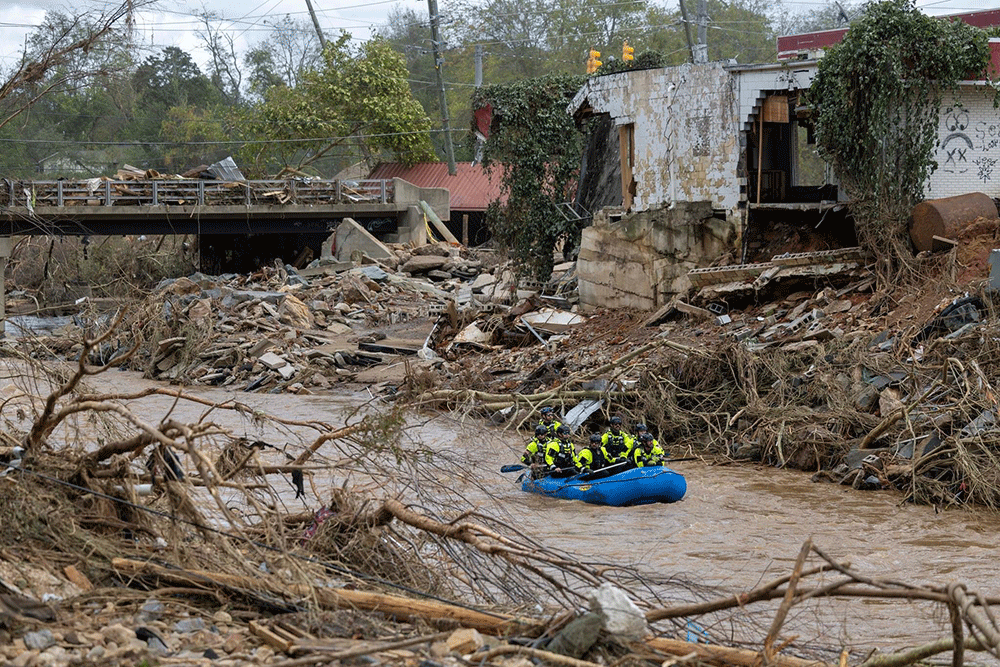Providers on Helene’s front lines: ‘We are stretched thin but able to help’

By Theresa Flaherty, Managing Editor
Updated 12:10 PM CDT, Fri October 4, 2024

A week after Hurricane Helene brought flooding and devastation across the Southeast, "it's like an atomic bomb went off," and HME providers, like impacted residents, are still assessing the damage and trying to recover, all the while taking care of patients.
The Category 4 storm, one of the worst in U.S. history, made landfall in Florida’s Big Bend region Sept. 26, before sweeping wind and record-breaking rainfall across a large area that included parts of Georgia, Virginia and the Carolinas.
“There’s flooding, there’s mud, homes are gone, roads fell off the mountain – it’s truly devastating,” said Amanda Minimi, director of corporate development for Asheville, N.C.-based Aeroflow Health, whose 600 employees have all been confirmed safe.
Asheville is part of the mountainous western North Carolina region that was especially hard hit, receiving 30 inches of rainfall and enduring massive flooding.
Brian Wilson, COO of Commonwealth Home Health Care in Danville, Va., which has Veterans Affairs contracts covering the entire state of North Carolina, has a truck delivering tanks, batteries, cylinders and donated supplies daily to the Asheville area.
“My staff says it’s like an atomic bomb went off,” he said. “Interstate 40 is half gone, but we’ve been able to find a different route through Charlotte up into Ashville. I’m proud of my staff.”
With dozens of locations in the Southeast, AdaptHealth lost power and sustained damages at locations in Florida, Georgia and, in North Carolina, saw one of its locations – Respracare – struck by a tornado that touched down in Rocky Mount.
“(That location), along with several other businesses in the area, was in the direct path of the storm,” said Shannone Raybon, deputy general counsel. “The building was severely damaged and our employees sustained injuries.”
At press time, several of AdaptHealth’s locations were still without power. The company was able to truck in fuel to combat shortages and was working through other logistics in real time, says Raybon.
“The only impediments in helping patients at this point have been infrastructure,” she said. “Passable roads and working lines of communication for patients has meant that we are identifying needs in waves and have had to work with highway patrol and other agencies to identify and respond to community needs.”
Chris Burgess says MED Emporium, part of Advent, which serves patients in four states in the region, including North Carolina, has played a critical role in trying to connect patients in need with government agencies with varied success.
“We are trying to contact patients and alert FEMA and/or Red Cross to those we cannot contact,” said Burgess, chief clinical officer for MED Emporium. “It has been very hard to make a connection with anyone at FEMA. My regional clinical manager has been on the phone getting transferred and being put on hold, but she is doing all she can.”
In southern Georgia, MRS Homecare’s Tifton location lost power for several days, but CEO Tyler Riddle credited the company’s disaster prep for helping it remain mostly operational and able to “plug the gaps” in health systems where needed.
“We’ve routed a bunch of cylinders and oxygen concentrators for Red Cross shelters to use,” said Riddle, who at press time was at “95%” working capacity. “Over the weekend, we were shifting machines and tanks to assist with the Emergency Management Association and city governments that are working on disaster relief. We are stretched thin, but we are able to help.”
Comments